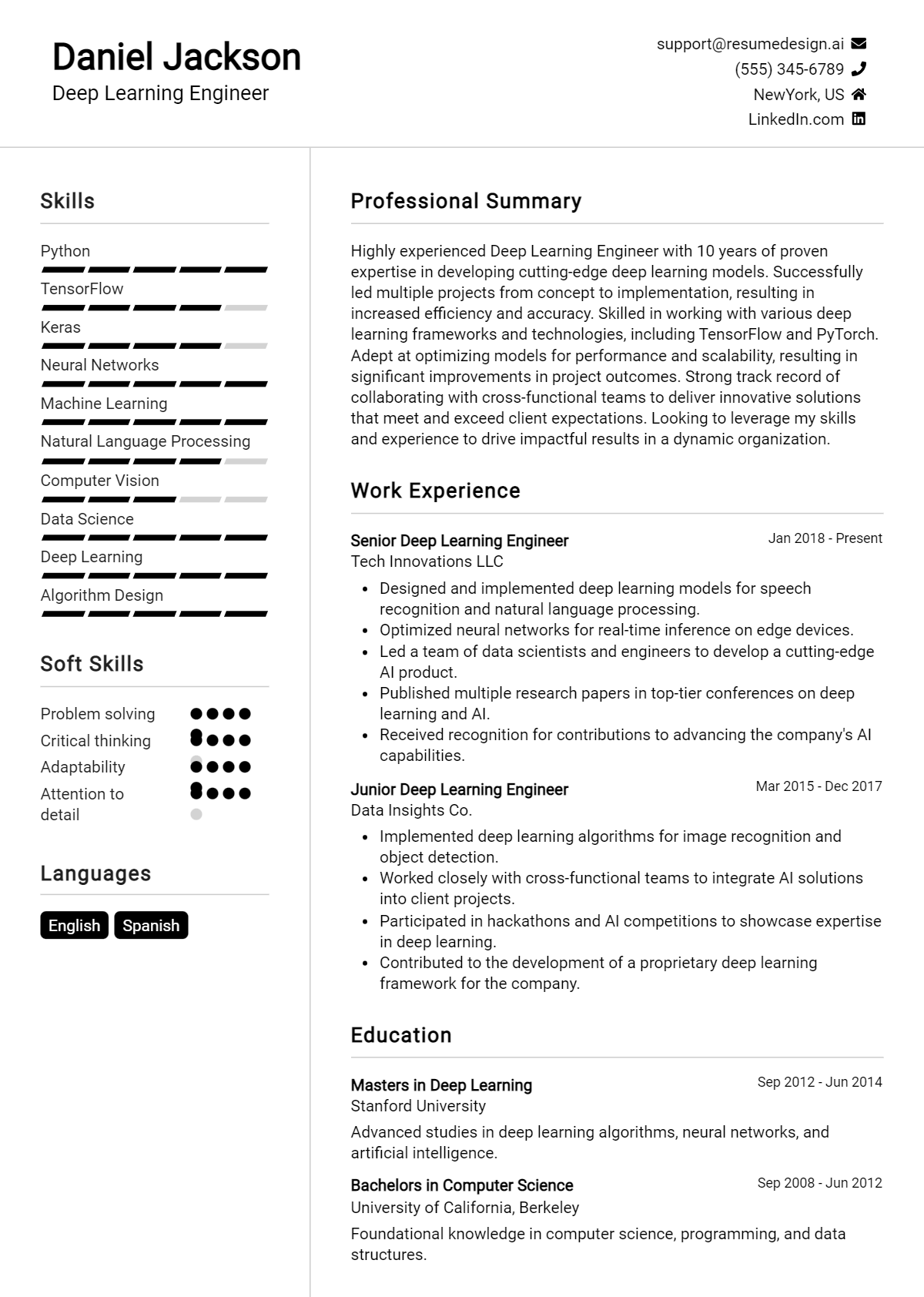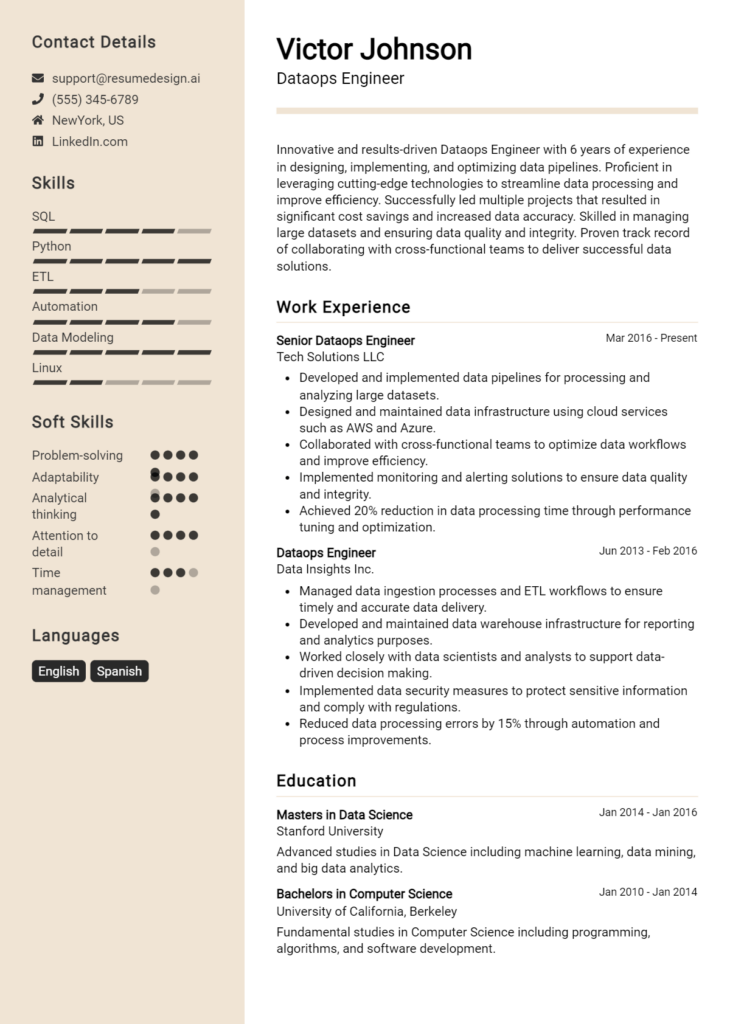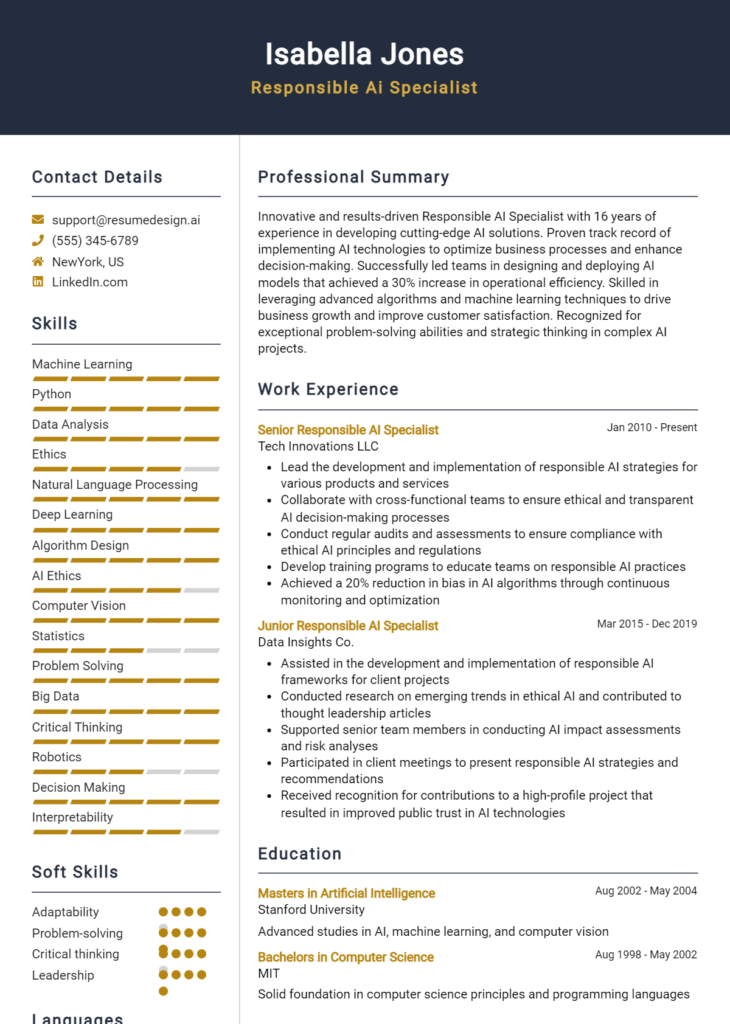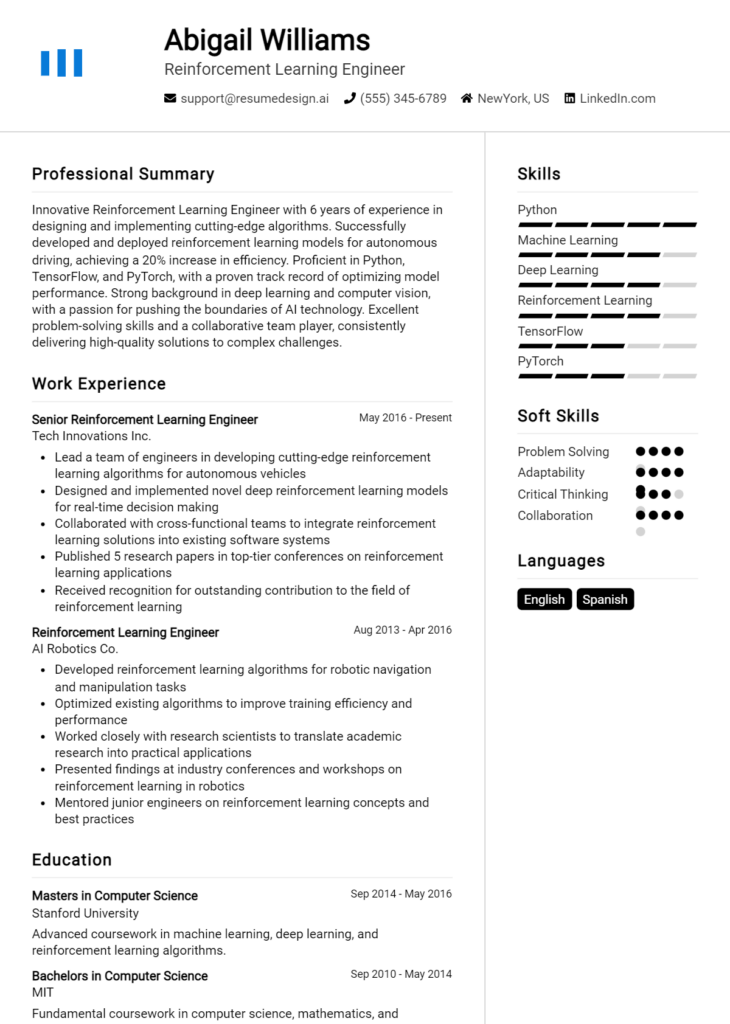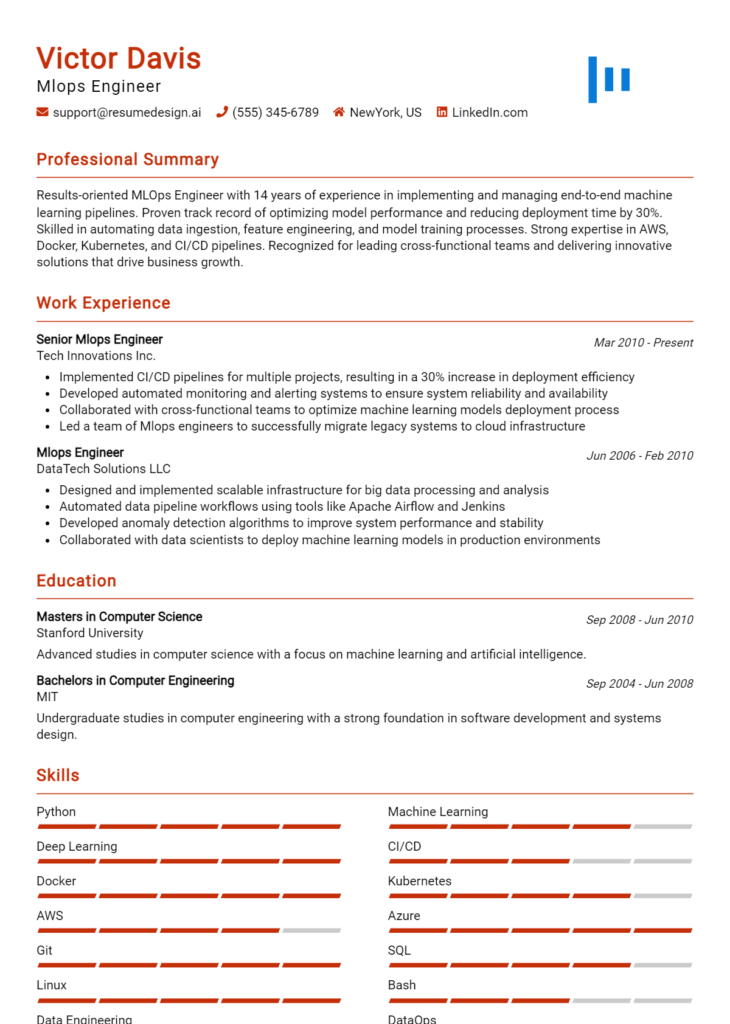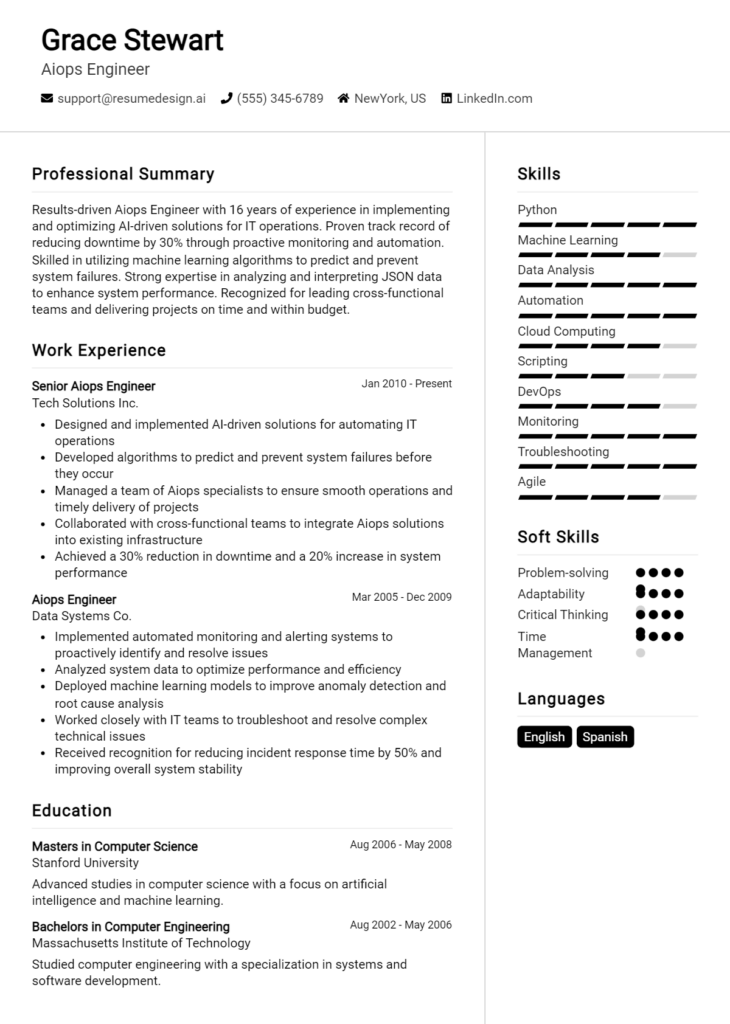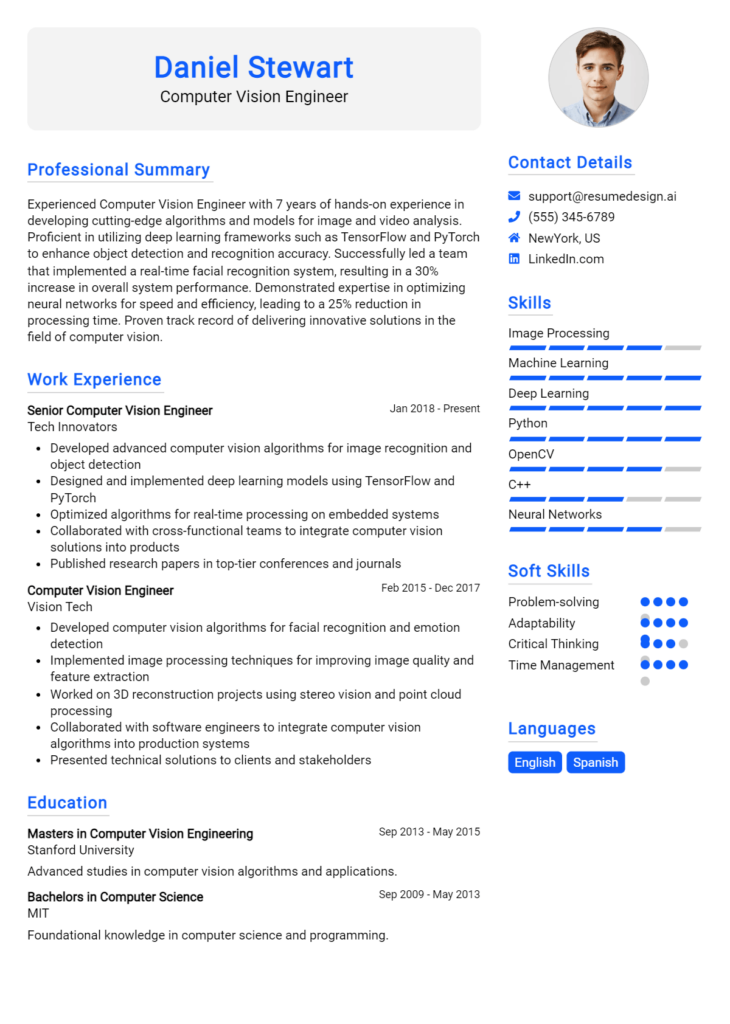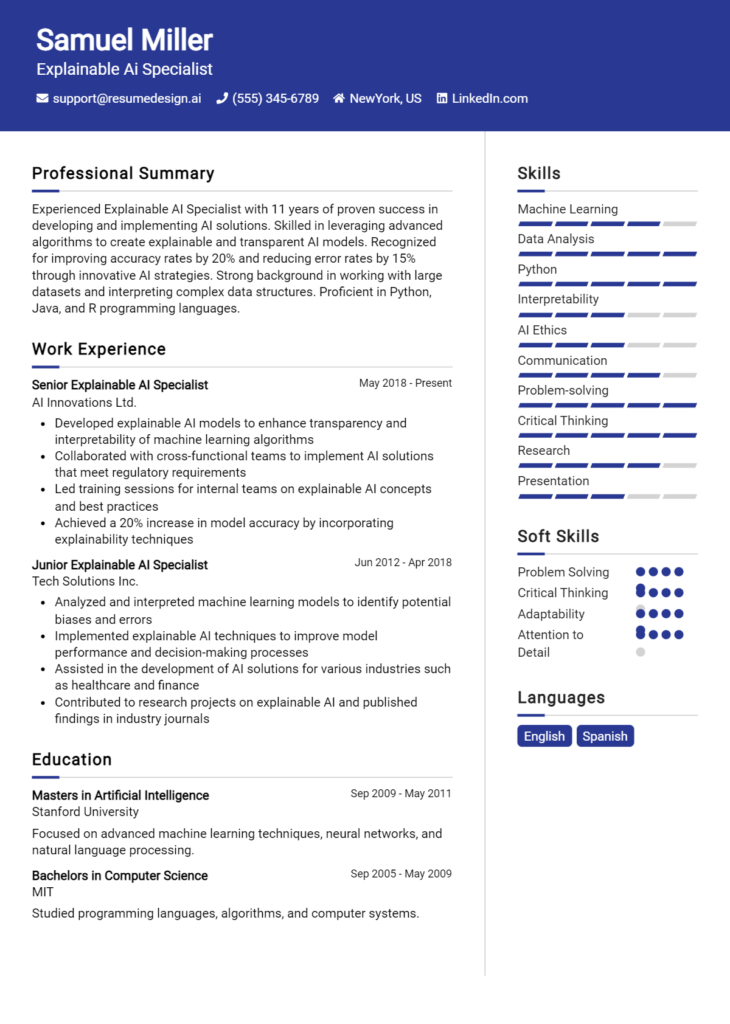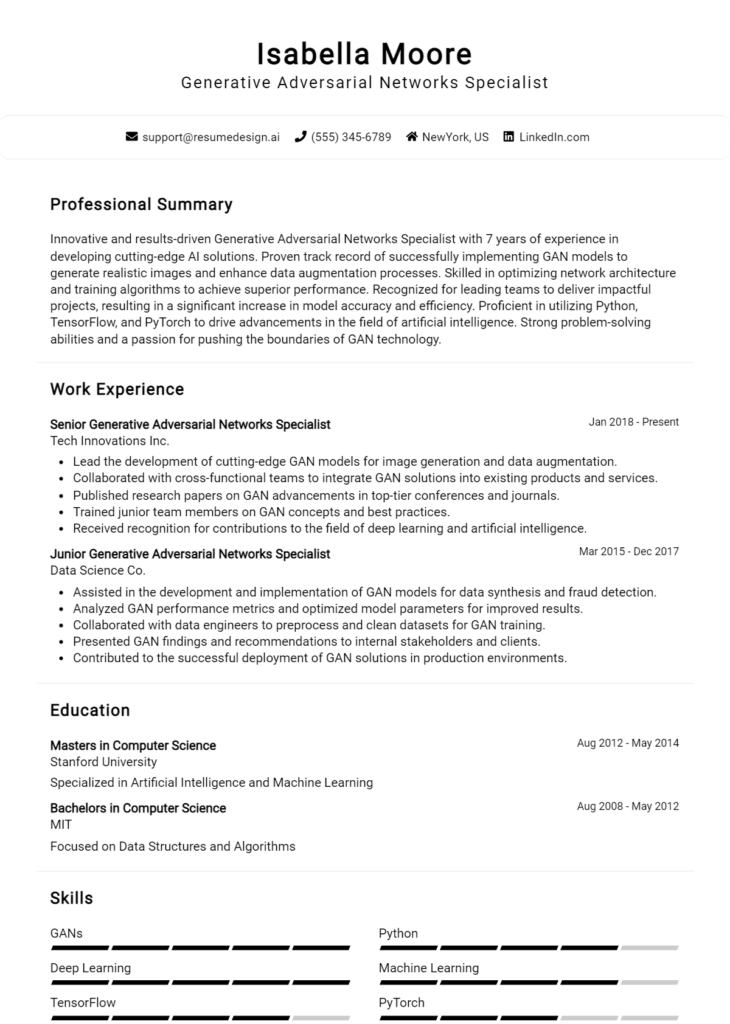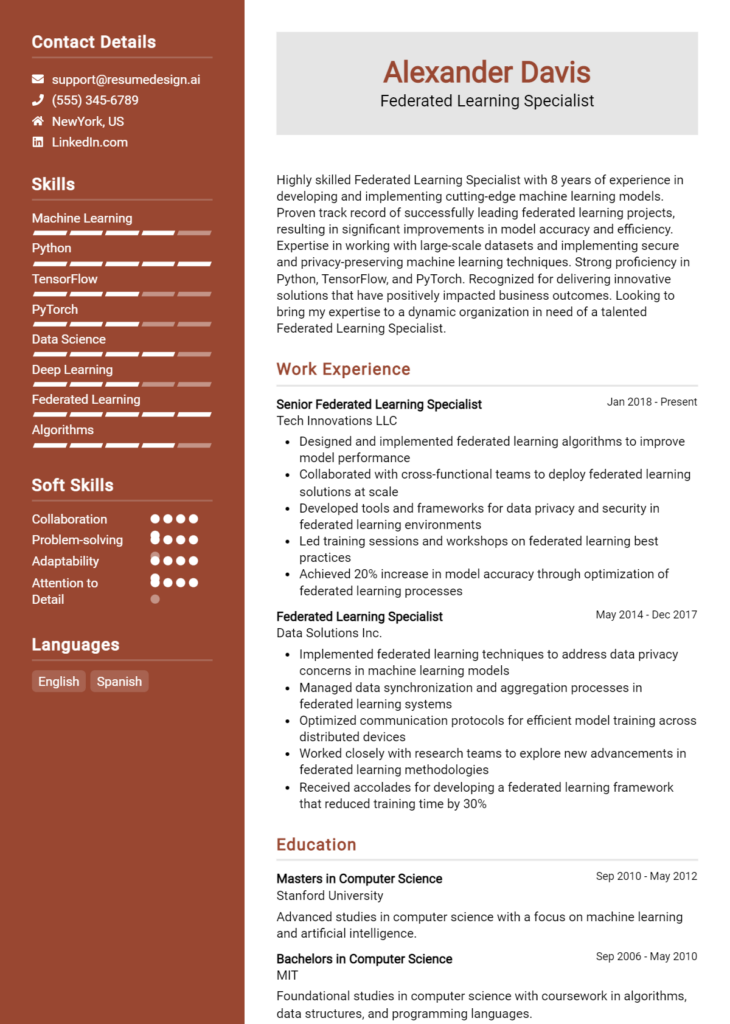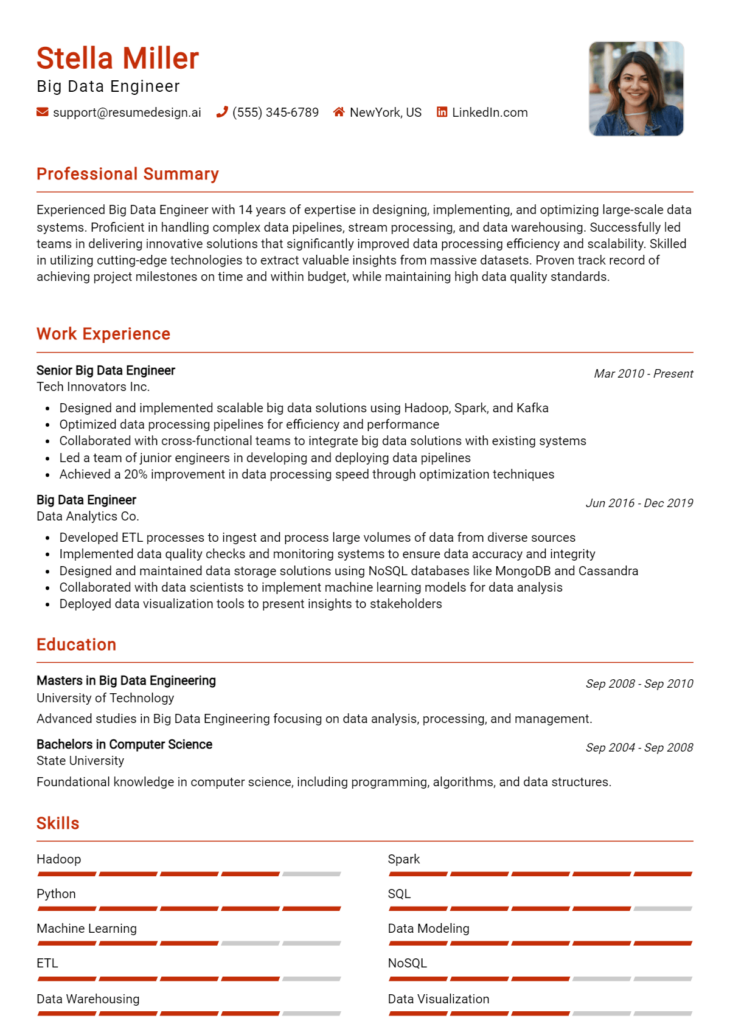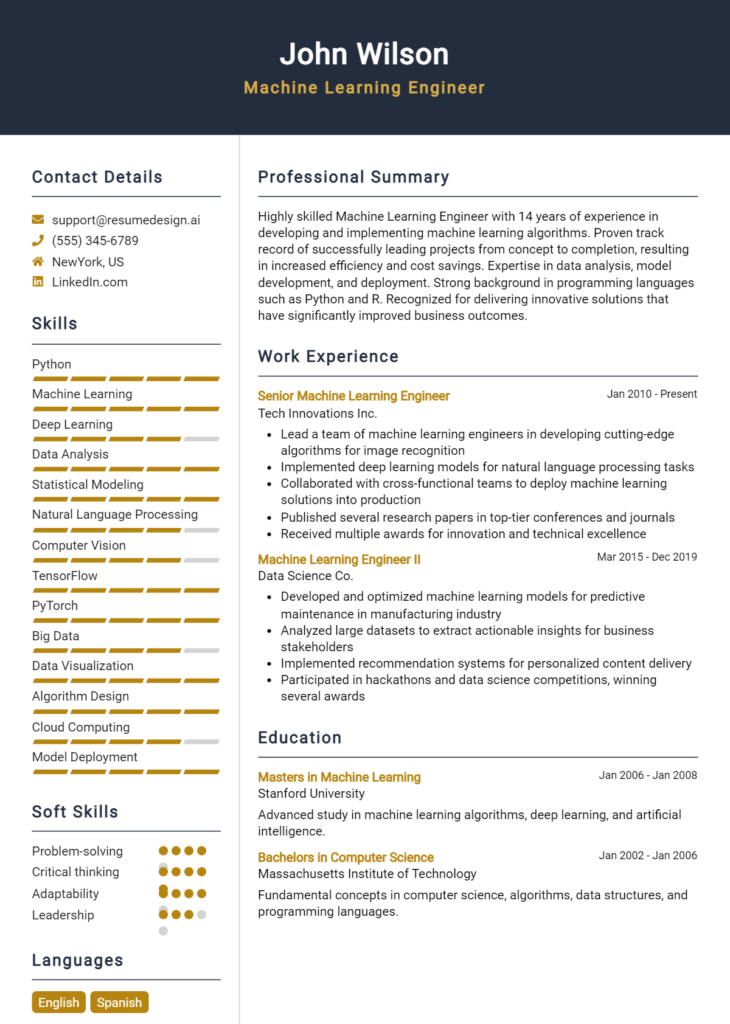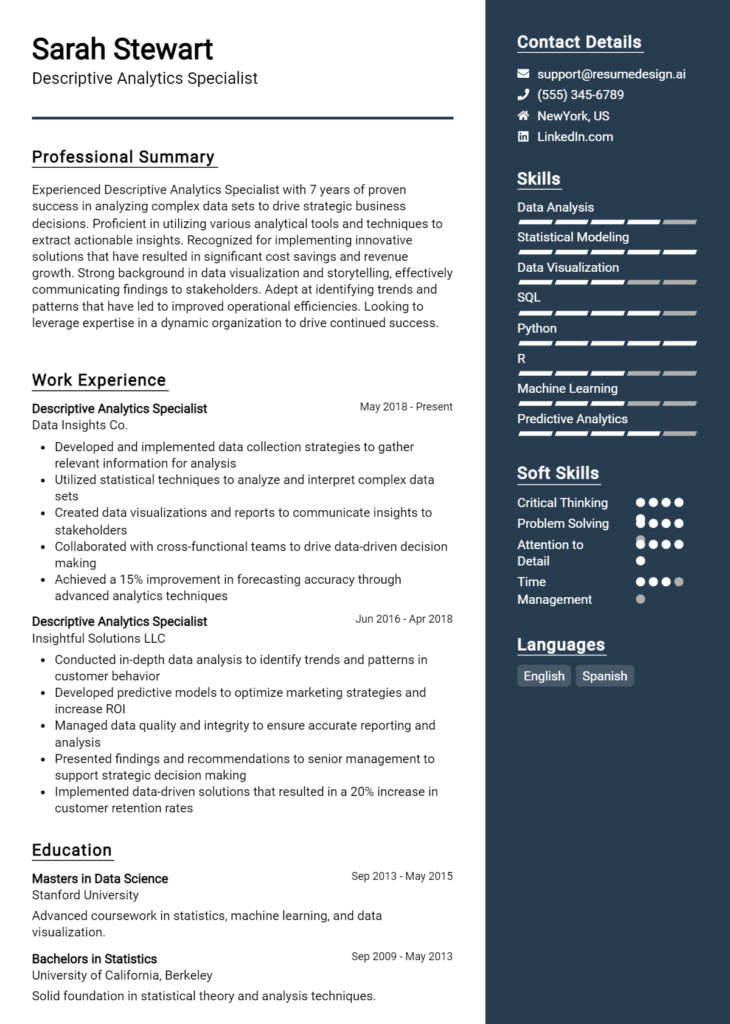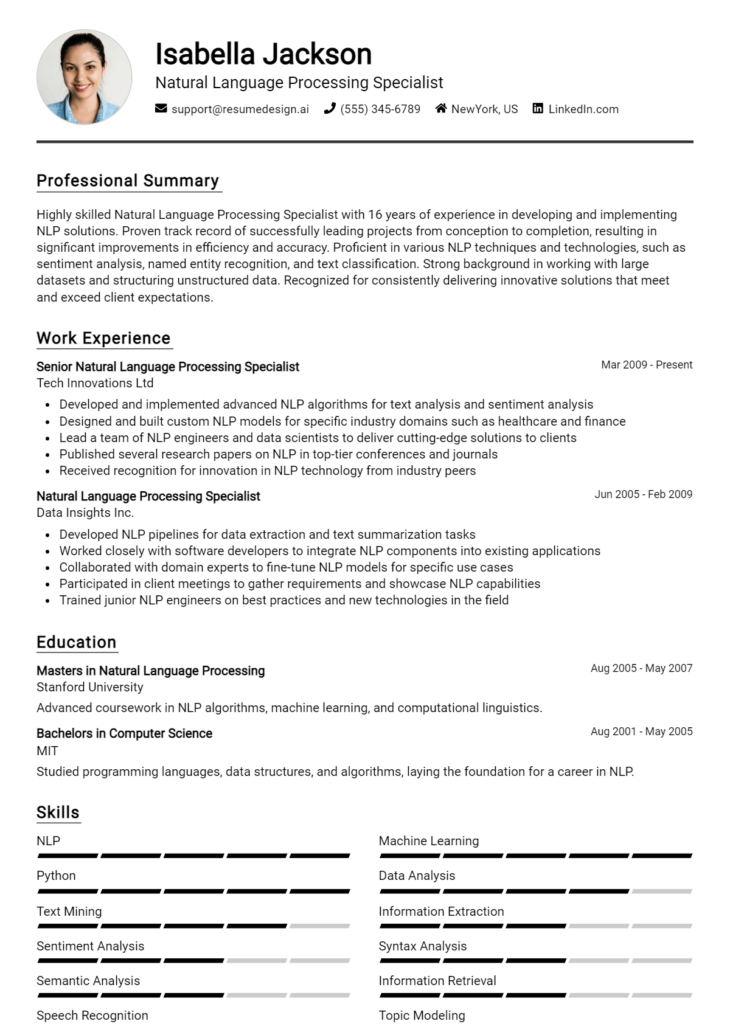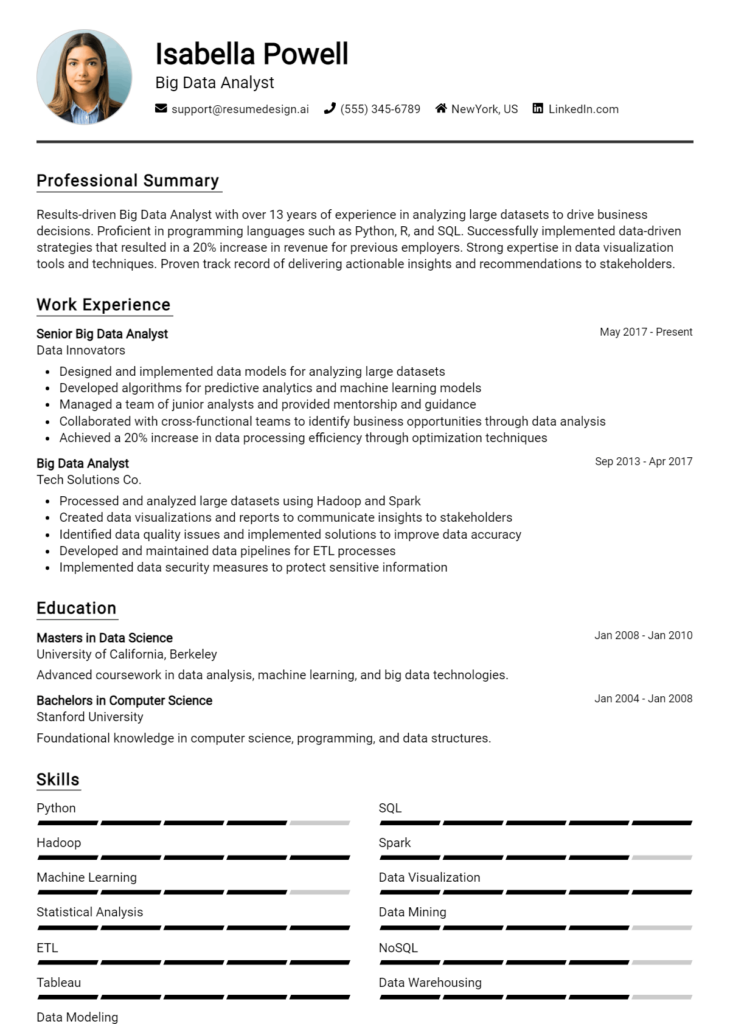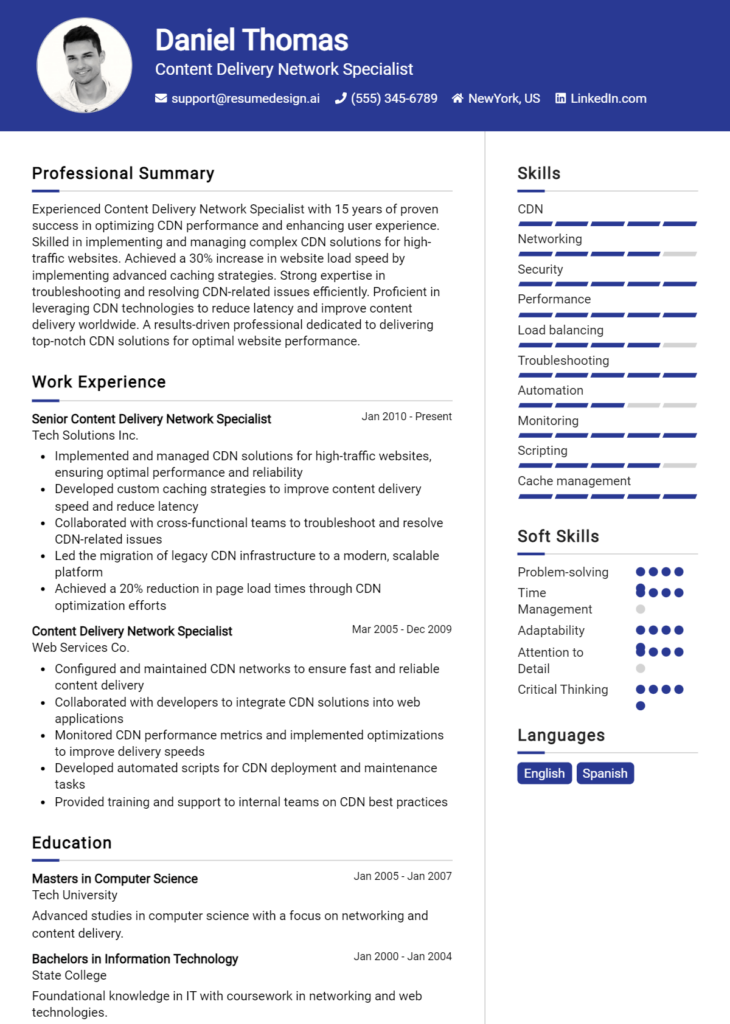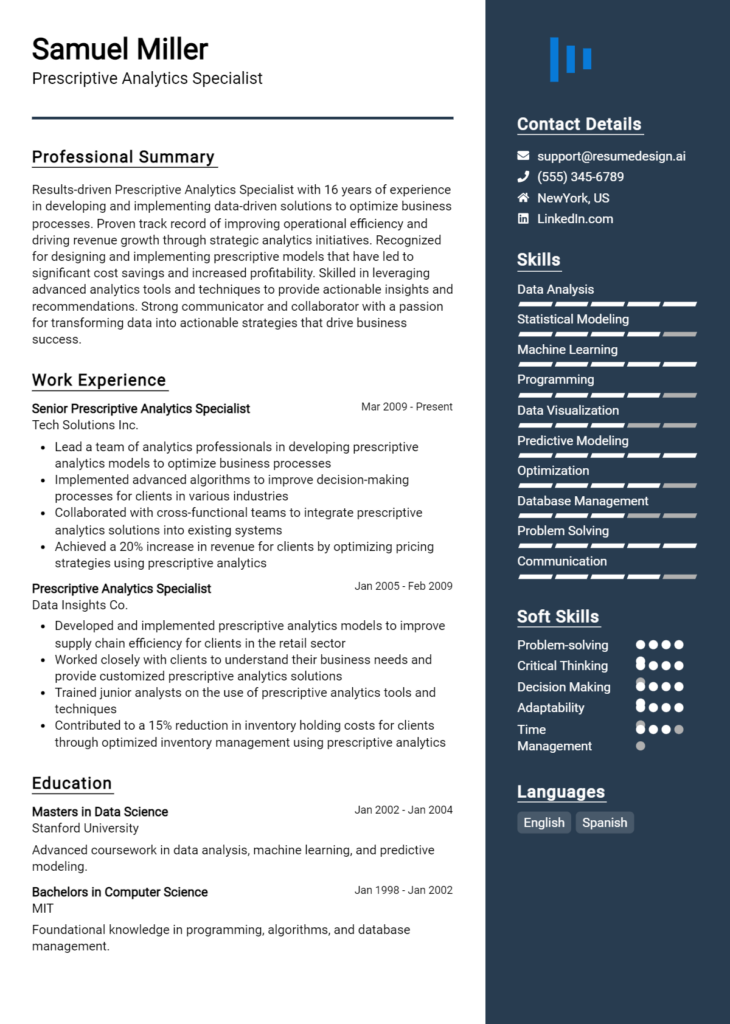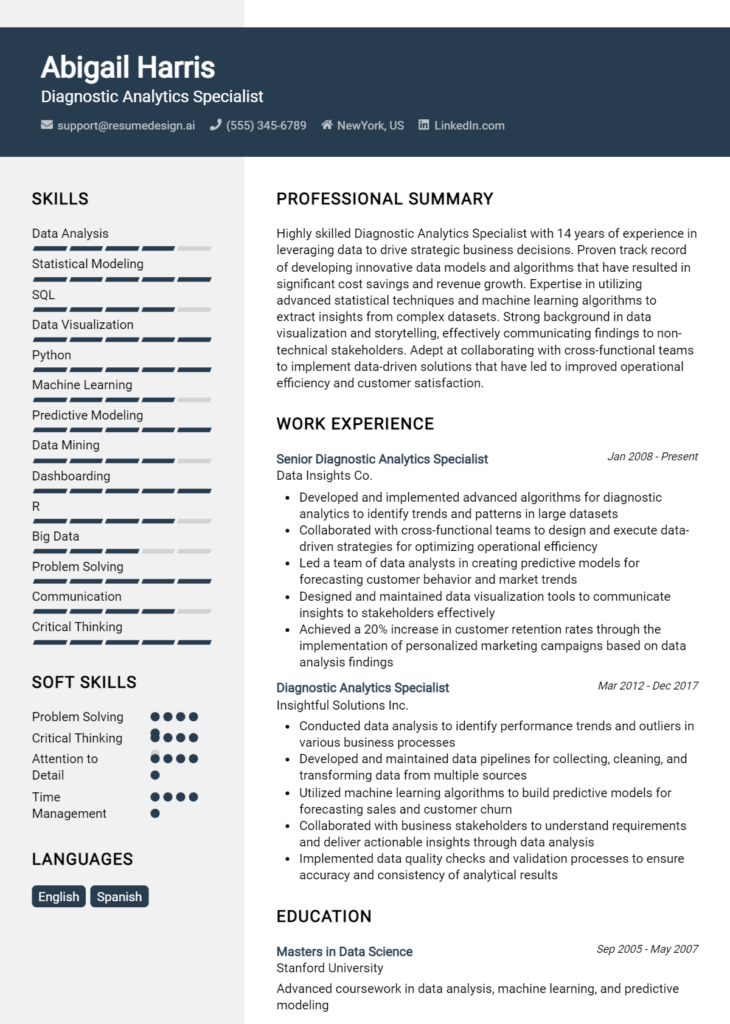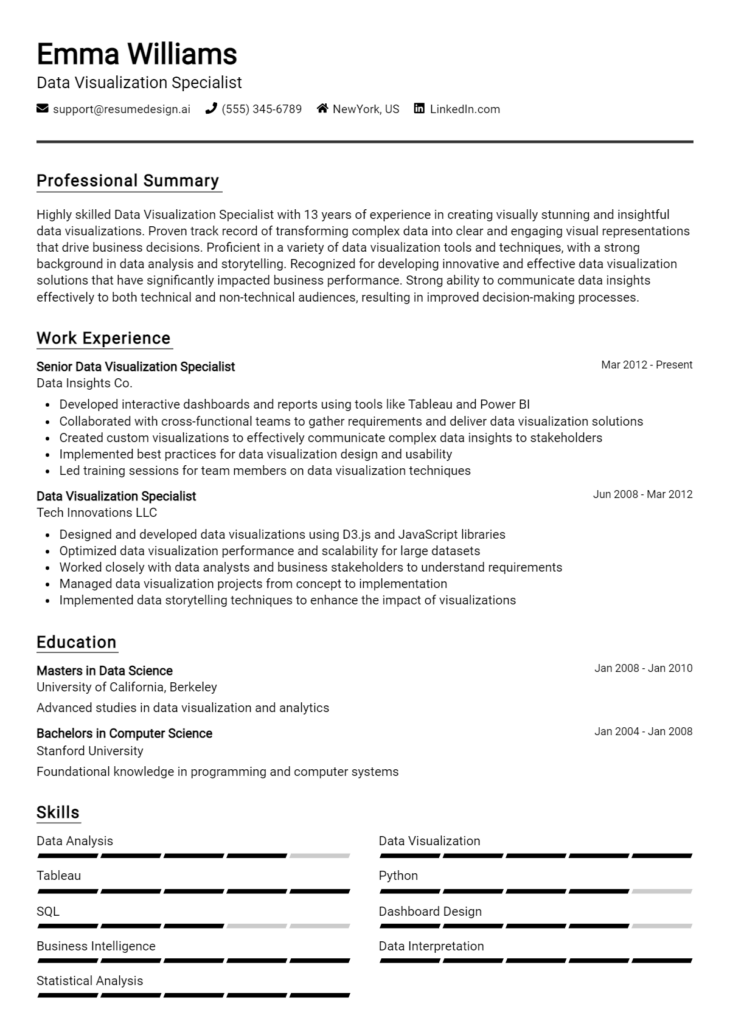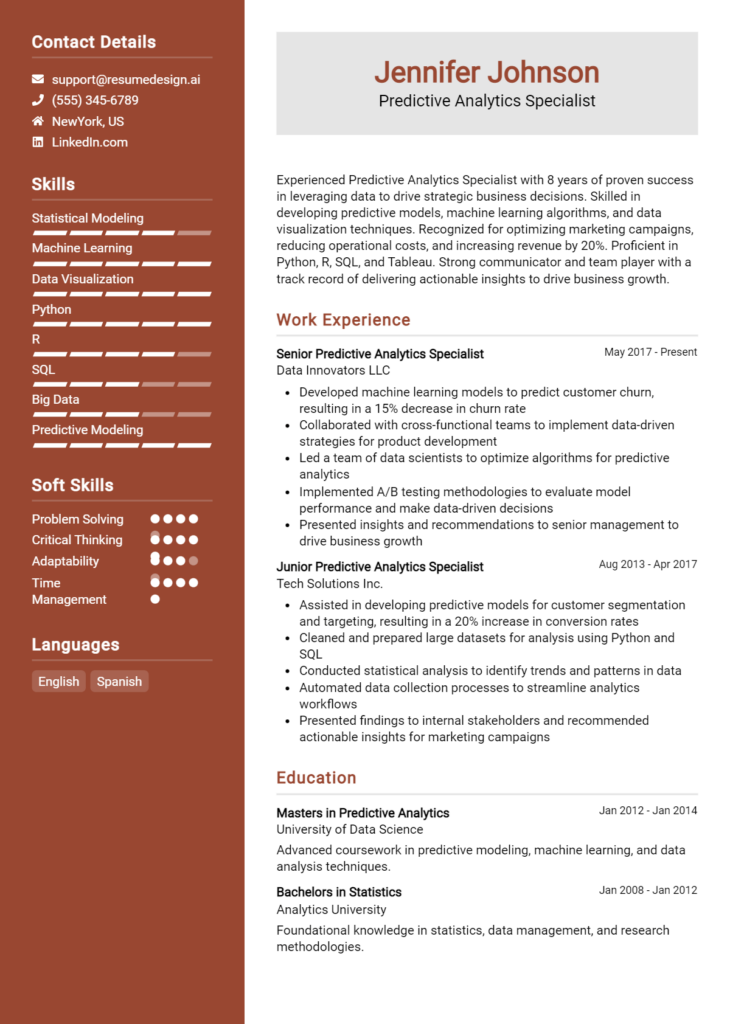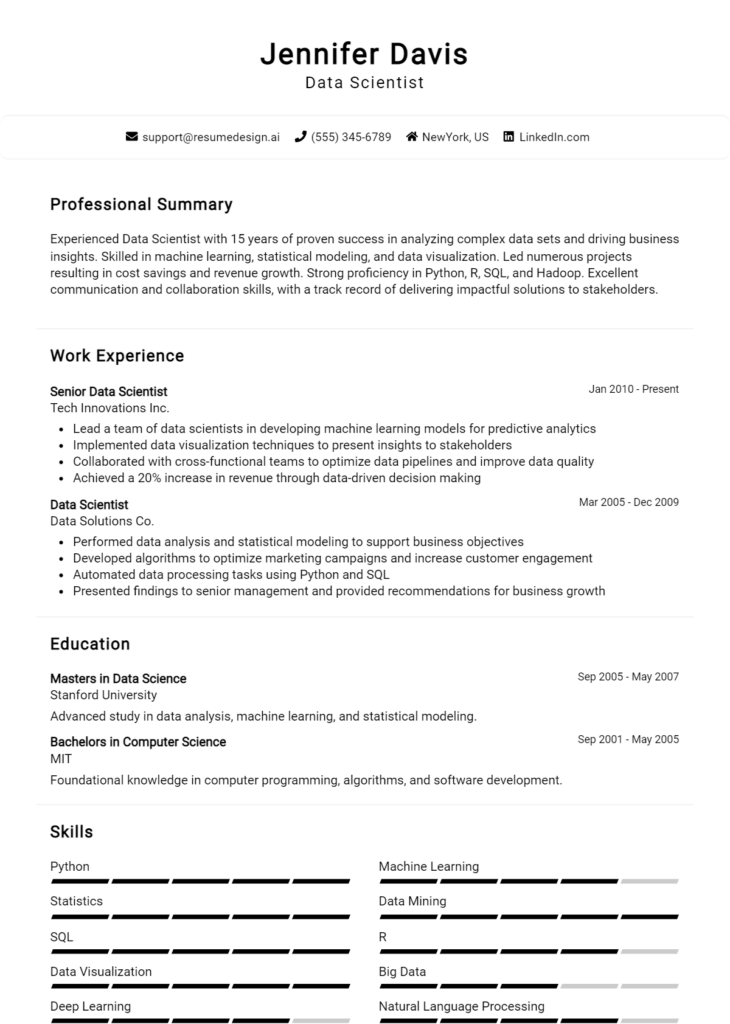Deep Learning Engineer Core Responsibilities
A Deep Learning Engineer is responsible for designing, implementing, and optimizing deep learning models to solve complex problems across various domains. This role requires a strong foundation in programming, mathematics, and data analysis, along with the ability to collaborate with cross-functional teams including data scientists, software engineers, and product managers. Technical skills, operational efficiency, and problem-solving aptitude are essential for achieving organizational goals. A well-structured resume can effectively highlight these qualifications, demonstrating the candidate's potential impact on the company's success.
Common Responsibilities Listed on Deep Learning Engineer Resume
- Develop and implement deep learning algorithms for various applications
- Collaborate with data scientists to preprocess and analyze large datasets
- Optimize neural network architectures for improved performance and efficiency
- Conduct experiments to validate model performance and iterate on designs
- Deploy models into production and monitor their performance
- Stay updated on advancements in deep learning technologies and methodologies
- Document processes and findings to facilitate knowledge sharing
- Work with cross-functional teams to align models with business objectives
- Troubleshoot and resolve issues related to model implementation and performance
- Provide technical guidance and mentorship to junior engineers
- Engage in code reviews to ensure high-quality and maintainable code
- Contribute to research papers or presentations on deep learning innovations
High-Level Resume Tips for Deep Learning Engineer Professionals
In today's competitive job market, a well-crafted resume is crucial for Deep Learning Engineer professionals looking to make a lasting impression on potential employers. Your resume is often the first point of contact with hiring managers, and it must effectively convey your technical expertise, skills, and achievements in a clear and concise manner. A compelling resume not only showcases your qualifications but also reflects your understanding of the deep learning landscape and your ability to contribute to innovative projects. This guide will provide practical and actionable resume tips specifically tailored for Deep Learning Engineer professionals to help you stand out from the crowd.
Top Resume Tips for Deep Learning Engineer Professionals
- Tailor your resume for each job application by aligning your skills and experience with the specific requirements outlined in the job description.
- Highlight relevant experience by detailing projects that demonstrate your proficiency in deep learning frameworks like TensorFlow, PyTorch, or Keras.
- Quantify achievements by using metrics to showcase the impact of your work, such as improvement in model accuracy or reduction in processing time.
- Include industry-specific skills, such as knowledge of computer vision, natural language processing, or reinforcement learning, to attract attention from specialized employers.
- Showcase your educational background, emphasizing degrees or certifications relevant to deep learning, such as a Master's in Machine Learning or a specialized course from a reputable online platform.
- Incorporate keywords from the job description to pass through Applicant Tracking Systems (ATS) and ensure your resume gets seen by hiring managers.
- Utilize a clean and professional layout that enhances readability, making it easy for employers to quickly identify key information.
- Demonstrate continuous learning by mentioning any recent workshops, conferences, or online courses related to deep learning that you have attended.
- Include links to your GitHub or personal projects where you've applied deep learning techniques, allowing potential employers to see your work firsthand.
Implementing these tips can significantly increase your chances of landing a job in the Deep Learning Engineer field. By showcasing your tailored skills and relevant experiences, you not only enhance your resume's appeal but also position yourself as a strong candidate poised to contribute to cutting-edge projects in the fast-evolving world of deep learning.
Why Resume Headlines & Titles are Important for Deep Learning Engineer
In the competitive field of deep learning engineering, a well-crafted resume headline or title holds significant importance. It serves as the first impression to hiring managers, providing a snapshot of a candidate’s qualifications and expertise in a single, impactful phrase. A strong headline can immediately grab attention, summarizing key skills and experiences that align with the job being applied for. It should be concise, relevant, and tailored to the specific role, ensuring that it resonates with potential employers and sets the tone for the rest of the resume.
Best Practices for Crafting Resume Headlines for Deep Learning Engineer
- Make it concise: Aim for a headline that is clear and to the point, typically one sentence or phrase.
- Be specific: Use terminology that reflects the deep learning field, highlighting relevant skills or technologies.
- Highlight key achievements: Incorporate notable accomplishments that align with the job description.
- Use action words: Start with strong verbs to convey a sense of proactivity and expertise.
- Include years of experience: If applicable, mention your level of experience to add credibility.
- Tailor to the job: Customize your headline for each application to reflect the specific requirements of the role.
- Focus on results: Convey the impact of your work, using metrics if possible to quantify your achievements.
- Keep it professional: Avoid gimmicky language or overly casual phrases; maintain a professional tone.
Example Resume Headlines for Deep Learning Engineer
Strong Resume Headlines
“Results-Driven Deep Learning Engineer with 5+ Years of Experience in Neural Network Design and Implementation”
“Innovative AI Specialist Focused on Advancing Computer Vision Solutions for Industry Applications”
“Expert in TensorFlow and PyTorch with Proven Track Record in Developing Scalable Deep Learning Models”
Weak Resume Headlines
“Deep Learning Engineer Seeking Opportunities”
“Experienced Professional in Technology”
The strong headlines are effective because they provide specific information about the candidate's expertise and experiences, making it clear why they are a suitable fit for the role. They include actionable language and relevant keywords that align with the expectations of hiring managers. In contrast, the weak headlines fail to impress due to their vagueness and lack of specificity. They do not convey any distinct qualifications or achievements, making it difficult for employers to see the candidate's potential value to their team.
Writing an Exceptional Deep Learning Engineer Resume Summary
A well-crafted resume summary is crucial for a Deep Learning Engineer, as it serves as the first impression a hiring manager will have of your qualifications and expertise. Within a few sentences, a strong summary can effectively highlight key skills, relevant experience, and notable accomplishments that align with the job role you're applying for. This brief yet impactful statement should be concise, tailored to the specific position, and designed to capture the attention of hiring managers, compelling them to read further into your resume.
Best Practices for Writing a Deep Learning Engineer Resume Summary
- Quantify Achievements: Use specific numbers to showcase your impact, such as performance improvements or project timelines.
- Focus on Skills: Highlight technical skills relevant to deep learning, such as proficiency in Python, TensorFlow, or neural network design.
- Tailor for the Job: Customize your summary to reflect keywords and requirements from the job description.
- Keep it Concise: Aim for 2-4 sentences that effectively convey your qualifications without unnecessary fluff.
- Highlight Relevant Experience: Mention specific projects or roles that demonstrate your expertise in the field.
- Showcase Problem-Solving Abilities: Emphasize your capacity to address complex challenges through deep learning techniques.
- Include Soft Skills: Briefly mention interpersonal skills like teamwork or communication that are vital for collaborative projects.
Example Deep Learning Engineer Resume Summaries
Strong Resume Summaries
Data-driven Deep Learning Engineer with 5 years of experience in developing and deploying scalable machine learning models. Achieved a 30% increase in model accuracy through innovative algorithm optimization. Proficient in Python, TensorFlow, and Keras.
Creative Deep Learning Specialist with a proven track record of delivering cutting-edge AI solutions. Successfully led a project that reduced processing time by 40% while improving predictive accuracy by 25%. Skilled in neural network architecture and data preprocessing.
Results-oriented Deep Learning Engineer with expertise in computer vision and natural language processing. Developed deep learning models that processed over 1 million images per day, enhancing system performance by 50%. Experienced in collaborating with cross-functional teams to drive AI initiatives.
Weak Resume Summaries
Deep Learning Engineer with experience in various projects. I have worked with different technologies.
Motivated engineer seeking opportunities in deep learning. I am passionate about technology and eager to learn more.
The strong resume summaries are considered effective because they provide quantifiable outcomes, specific skills, and directly relate to the responsibilities of a Deep Learning Engineer. They demonstrate clear achievements and relevant expertise, making them more appealing to hiring managers. Conversely, the weak summaries lack detail, specificity, and measurable results, failing to convey the candidate's qualifications and potential impact in the role.
Work Experience Section for Deep Learning Engineer Resume
The work experience section of a Deep Learning Engineer resume is critical for demonstrating the candidate's technical capabilities, leadership qualities, and ability to deliver high-quality products. This section serves as a platform to showcase not just the roles held but also the impact made within those roles. By quantifying achievements and aligning experiences with industry standards, candidates can effectively highlight their contributions to projects, teams, and organizational goals, making a compelling case for their suitability for the position.
Best Practices for Deep Learning Engineer Work Experience
- Clearly outline your technical skills relevant to deep learning, such as proficiency in frameworks like TensorFlow or PyTorch.
- Quantify your achievements with metrics, such as performance improvements, accuracy rates, or reduced processing time.
- Highlight your role in team collaboration, emphasizing leadership or mentoring experiences.
- Use action verbs to describe your contributions, making your responsibilities and achievements more impactful.
- Align your experience with industry standards and trends to demonstrate relevance and adaptability.
- Include specific projects that showcase your ability to solve complex problems using deep learning methodologies.
- Tailor your experience section to the job description by incorporating relevant keywords and technologies.
- Showcase any publications, patents, or contributions to open-source projects that underline your expertise.
Example Work Experiences for Deep Learning Engineer
Strong Experiences
- Led a team of 5 engineers to develop a deep learning model that improved image recognition accuracy by 30%, resulting in a 20% increase in user engagement.
- Implemented a novel neural network architecture that reduced processing time by 40% for real-time data analysis, enhancing overall system efficiency.
- Collaborated with cross-functional teams to deploy a predictive maintenance solution that decreased machine downtime by 25%, saving the company $500,000 annually.
- Published a paper on advanced deep learning techniques in a peer-reviewed journal, contributing to the body of knowledge in the field and enhancing company visibility.
Weak Experiences
- Worked on various deep learning projects without specifying contributions or outcomes.
- Assisted in code development and testing for machine learning applications.
- Participated in team meetings and contributed ideas when necessary.
- Worked with deep learning technologies and tools.
The examples provided illustrate the distinction between strong and weak experiences. Strong experiences are characterized by specific, quantifiable outcomes and clear demonstrations of technical leadership and collaboration. They highlight the candidate's direct impact on projects and the organization. Conversely, weak experiences lack detail and measurable results, making it difficult to assess the candidate’s true contributions and expertise in deep learning.
Education and Certifications Section for Deep Learning Engineer Resume
The education and certifications section of a Deep Learning Engineer resume is crucial as it provides prospective employers with a snapshot of the candidate's academic qualifications and professional development. This section not only highlights the candidate's foundational knowledge in computer science, mathematics, and artificial intelligence but also demonstrates their commitment to continuous learning through industry-relevant certifications. By showcasing relevant coursework, certifications, and specialized training, candidates can greatly enhance their credibility and align themselves with the specific requirements of the job role, making them stand out in a competitive job market.
Best Practices for Deep Learning Engineer Education and Certifications
- Focus on relevant degrees such as Computer Science, Data Science, or Engineering.
- Include industry-recognized certifications like TensorFlow Developer, AWS Certified Machine Learning, or similar credentials.
- List relevant coursework that specifically pertains to deep learning, machine learning, or artificial intelligence.
- Highlight any specialized training programs or workshops attended that enhance your skill set.
- Order the educational qualifications chronologically, starting with the most recent.
- Be specific about your achievements, such as honors or GPA, if they are impressive and relevant.
- Avoid including degrees or certifications that are outdated or unrelated to the field.
- Regularly update this section to reflect new learning and professional development efforts.
Example Education and Certifications for Deep Learning Engineer
Strong Examples
- M.S. in Computer Science with a focus on Artificial Intelligence, Stanford University, 2022
- TensorFlow Developer Certificate, 2023
- Deep Learning Specialization, Coursera (Andrew Ng), 2021
- Graduate Certificate in Machine Learning, University of California, Berkeley, 2023
Weak Examples
- B.A. in Philosophy, University of Texas, 2010
- Certification in Basic Computer Skills, 2015
- Online Course in Graphic Design, 2018
- High School Diploma, 2005
The strong examples are considered effective because they directly relate to the skills and knowledge required for a Deep Learning Engineer, showcasing advanced education and relevant certifications that demonstrate expertise in the field. In contrast, the weak examples reflect educational qualifications and certifications that are either outdated or unrelated to deep learning, which do not add value to the candidate’s profile and may detract from their overall credibility in the eyes of potential employers.
Top Skills & Keywords for Deep Learning Engineer Resume
In the ever-evolving field of artificial intelligence, the role of a Deep Learning Engineer is pivotal. As organizations increasingly rely on machine learning and deep learning technologies to drive innovation and efficiency, the importance of a well-crafted resume featuring the right skills cannot be overstated. A strong resume not only highlights technical proficiency but also showcases essential soft skills that contribute to effective teamwork and problem-solving. Employers look for candidates who can not only perform complex tasks but also communicate effectively and adapt to rapidly changing technologies. Therefore, understanding the key skills required for this role is crucial for any aspiring Deep Learning Engineer.
Top Hard & Soft Skills for Deep Learning Engineer
Soft Skills
- Problem-solving
- Communication
- Team collaboration
- Critical thinking
- Adaptability
- Creativity
- Attention to detail
- Time management
- Empathy
- Leadership
Hard Skills
- Proficiency in Python and/or R
- Experience with TensorFlow and Keras
- Knowledge of neural networks and architectures
- Familiarity with deep learning frameworks
- Understanding of data preprocessing techniques
- Experience with cloud platforms (AWS, Azure, GCP)
- Skills in model deployment and optimization
- Proficient in machine learning algorithms
- Experience with version control (Git)
- Knowledge of data visualization tools
To further enhance your resume, consider exploring skills and work experience that are relevant to the evolving demands of the Deep Learning Engineer position.
Stand Out with a Winning Deep Learning Engineer Cover Letter
Dear [Hiring Manager's Name],
I am excited to apply for the Deep Learning Engineer position at [Company Name] as advertised on [where you found the job posting]. With a solid foundation in artificial intelligence and extensive experience in developing deep learning models, I am confident in my ability to contribute to your team and help drive innovative solutions. My background in computer science, coupled with hands-on experience in machine learning frameworks like TensorFlow and PyTorch, has equipped me with the skills necessary to tackle complex challenges in the field of deep learning.
At [Previous Company Name], I successfully implemented a convolutional neural network (CNN) that improved image classification accuracy by 20% compared to previous models. By leveraging techniques such as data augmentation and transfer learning, I was able to enhance model performance while reducing training time. My collaborative approach to working with cross-functional teams allowed me to ensure that the models were not only robust but also aligned with the overall project goals. I am particularly drawn to [Company Name]'s commitment to advancing technology, and I am eager to apply my expertise to contribute to your cutting-edge projects.
Furthermore, I am passionate about staying current with the latest research and advancements in deep learning. I regularly participate in online courses and workshops, and I have published several papers on topics such as unsupervised learning and reinforcement learning. I believe that continuous learning is essential in this fast-paced field, and I am dedicated to bringing innovative ideas and solutions to [Company Name]. I am excited about the opportunity to collaborate with your talented team and contribute to the development of transformative AI applications.
Thank you for considering my application. I look forward to discussing how my skills and experiences align with the goals of [Company Name] and how I can contribute to your success as a Deep Learning Engineer. Please feel free to contact me at [your phone number] or [your email address] to schedule a conversation.
Sincerely,
[Your Name]
Common Mistakes to Avoid in a Deep Learning Engineer Resume
When crafting a resume for a Deep Learning Engineer position, it's crucial to present your skills and experiences clearly and effectively. Unfortunately, many candidates fall into common pitfalls that can undermine their chances of landing an interview. By avoiding these mistakes, you can create a compelling resume that showcases your qualifications in the highly competitive field of deep learning.
Vague Job Descriptions: Failing to provide specific details about your previous roles can leave hiring managers unsure of your responsibilities and achievements. Instead, use quantifiable metrics to demonstrate your impact.
Ignoring Relevant Skills: Many applicants list generic programming languages and tools without emphasizing the deep learning frameworks and libraries relevant to the job. Be sure to highlight your expertise in TensorFlow, PyTorch, Keras, and others.
Lack of Projects or Portfolio: Not including personal or professional projects can make it difficult for recruiters to assess your hands-on experience. Showcasing a portfolio of relevant projects can set you apart from other candidates.
Overloading with Technical Jargon: While it's important to demonstrate technical proficiency, excessive jargon can confuse recruiters who may not have a deep technical background. Aim for clarity and conciseness.
Omitting Soft Skills: Technical skills are vital, but soft skills like teamwork, communication, and problem-solving are equally important in collaborative environments. Highlight instances where you've demonstrated these abilities.
Ignoring Keywords from Job Descriptions: Many companies use applicant tracking systems (ATS) to filter resumes. Not tailoring your resume to include relevant keywords can result in your application being overlooked.
Poor Formatting: A cluttered or unprofessional layout can detract from the content of your resume. Use a clean, organized format that makes it easy for hiring managers to skim through your qualifications.
Neglecting Continuous Learning: The field of deep learning evolves rapidly. Failing to mention recent courses, certifications, or conferences can make it seem like you aren't keeping up with industry trends.
Conclusion
As we explored the critical aspects of the Deep Learning Engineer role, it became clear that a strong foundation in machine learning, proficiency in programming languages like Python, and familiarity with deep learning frameworks such as TensorFlow and PyTorch are essential. Additionally, experience with data preprocessing, model training, and optimization techniques are crucial for success in this field. Understanding the latest trends in artificial intelligence and staying updated with ongoing research can also set a candidate apart from the competition.
In light of this information, now is the perfect time to review and enhance your Deep Learning Engineer resume. Make sure it accurately reflects your skills, experiences, and projects that demonstrate your expertise in deep learning technologies.
To assist you in this process, consider utilizing the following resources:
- Explore resume templates to find a layout that suits your style.
- Use the resume builder to create a polished and professional resume effortlessly.
- Check out resume examples to gather ideas on how to present your qualifications effectively.
- Don’t forget to craft a compelling cover letter using cover letter templates that can complement your resume.
Take action today and ensure your resume stands out in the competitive field of deep learning engineering!

